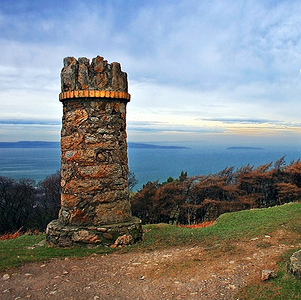If You Love Something, You Have to Protect It

You might have heard this advice before: “If you love something, set it free.”
But I’m not so sure about that. It seems to me that if you really love something, setting it free is exactly what you don’t want to do. I’ve been thinking about this idea ever since a friend gave me the opposite advice recently:
“If you love something, you have to protect it.”
I think that’s closer to the truth. In other words, if you love something, hold on tight and don’t let go!
Every day you have to make choices that ensure the thing you love continues to thrive. So if you find a way of life that is good for you, do whatever it takes to keep it.
Complacency—the middle ground—is the attractive, safe choice. But fall into complacency, and that thing you love might wander off and be gone before you notice. Then what? Better to protect it in the first place.
A relationship does not protect itself; it requires active work and humility. A way of life does not protect itself; it requires discipline and attention.
***
I used to run a business that died a slow death because I got tired of it. I could see it coming for nearly two years, but I failed to take action to reverse the process. Why didn’t I sell it, hire someone to run it, restructure, or something else? The best answer is that I didn’t love it, so I failed to protect it. And thus it died.
These days I feel like I’m working on something much more important. It’s OK that I lost a business that could have created financial independence for the rest of my life. I don’t regret the loss, and sometimes I actually think it was meant to be.
But I also don’t want that to happen again, so I’ve learned to take steps to guard against my own weaknesses. Where much is given, much is required. If you love something, you have to protect it.
What decisions can you make to protect what you love?
###
Book News: Thanks for your tremendous support of the AONC book launch. I’m currently on the road visiting every U.S. state—sign up to come out here.
***
Image: Richard








42 Comments
I wholeheartedly agree: anything you love requires protection – AND care. Regular maintenance. Whether it’s a spouse, a dog, a toaster or a company. Never got that ‘set it free’ thing… I cling to what I love – we all should.
Wow Chris,
This is EXACTLY what I needed to hear today. I would love to chat more with you but I better get to the hustle! Thanks!
Or should it be: if you love something, nurture it?
I would agree if you love something you will protected and work even harder to take it to the next level. You give a great example about your business that slowly died, it died because you wanted to move on to something new and find something you would enjoy doing everyday.
Marios
I’d say that “set it free” never meant, “give it away.”
The two most common times I see this used is relationships and death.
With relationships, it’s referring to being overprotective. Relationships require a lot a work, yes, but they also depend on trust. “Set it free,” in this context refers to letting your partner have friends of their own, do things by themselves if they’d like, have friends you don’t approve of. By all means, protect the person; tell them you don’t approve of the friends, but it’s not your choice to say they can’t have them.
Likewise, with death, imagine a life support machine that keeps a loved one alive but in great pain. It’s difficult to let go, but specifically because you love them you have to. That, to me, falls under setting them free and protecting them.
My point is that perhaps the phrase should be “If you love something, protect its freedom.” Except now I sound like a tea partier.
In one of the many personality assessments that I have taken over the years, I got the response that a part of me feels like I have no control over things and that I just let them go. I didn’t entirely agree with this, but from experience, I have found that no matter how hard I try I can’t always affect the outcome.
I had a business that I had fallen out of love with and I tried VERY, VERY hard to sell it, etc. but it didn’t work out the way I had intended.
So, I’m not sure that if working extra hard to protect something always works, but I do keep trying!
@Bayard- I agree and appreciate the thoughts you are trying to articulate here- along with your concern about being viewed as a member of the Tea Party- no worries, I don’t think this blog appeals to that demographic! LOL
Chris, this one really resonated with me, thanks for writing it. I built up a business for over twenty years, but didn’t love it and it died a slow death too. But now I am continuing a lifelong passion, doing something that is more meaningful to me and and brings joy to others. The trick is finding what you love to do, and then figure out how to make money at it.
I agree whole heartily that if we are complacent, we’ll lose the things we love. If you love something, you have to value it. And perhaps this is the best protection.
I agree to a point, and then I whole heartedly disagree. Natural selection has to have its moment. As the father of a son who is severely autistic, there’s a point where you have to face reality and adjust. You cannot protect what you love (security is an illusion); you invest and you grow and you nurture, but at some point there has to be a return on that growth (however small) that you have to release control over. With a child with autism, you smile when the routines you’ve nurtured work and take a step back from your child. No… protect what you love is the wrong way of saying it. You have to nurture what you love. But try to protect it and somewhere the shield will fail. In the end security is an illusion.
The first thing I thought of at the beginning of the post is that neither is right. Or maybe both are right. Just because you love something[someone], that doesn’t mean it[they] serves your best, or that you serve its[their] best.
For example, I’ve been with the wrong partners for the wrong reasons, even tho I loved them. And I’ve had the wrong job where I’ve loved the work, and I’ve had to let the work go with the job. Or maybe those examples aren’t really love? Just attachment?
I do know that what I try to live by is fIguring out what’s for my best: what will support my growth in compassion for others and myself, so that I may serve others in what’s best for them. (That’s kinda awkward wording, but that’s because I’ve needed to recently reword it.)
Annie
Lovely thoughts. If you love something, give it your attention and consideration (active work) and trust it to develop naturally and organically (humility).
Perhaps “setting something free” means respecting the natural integrity of a person or a project, and is directly linked to humility. Rather than letting something go or wither when it ceases to progress based on preconceived notions and expectations, re-engage with an open mind and a willingness to try an unanticipated direction.
Set the expectations free, not the beloved.
Thanks for this post. I’ve been grappling with this very issue in my latest project. It takes a lot of courage to drop the control issues and maintain a high degree of comitment to a vision, while allowing it to unfold in its own way. Especially online, where people are watching!
Turns out business is a great way to learn about unconditional love. Go figure.
I appreciate the point about protection, but I also think there is a difference between protection and control. The opposite of protection is neglect. The opposite of freedom is not protection, but rather control.
It’s a very fine line between protecting something and trying to control it. But as always, therein lies the grace that makes a well-lived life.
It’s funny how I just posted my Inspirational word of the week yesterday and the word was protect! However, my main lesson was “Just because you must protect yourself, doesn’t mean you have to be an asshole about it.” Loved your post and hope your having a great time on tour with your new book. Mine should be arriving any day now! I’ll be looking to have you sign it when you come to Ann Arbor Michigan!
I have to say that, at first, I thought you were full of mud. After reading what you said, I realized you were right! I have done the same thing with a business and a relationship. I see what you are saying and you are so right!
A lot of our inner struggles are solved by practicing the fine art of appreciation. Making it a daily habit to appreciate what we have keeps our passion roaring. As important as appreciating what we LOVE, is appreciating the things we take for granted (wow! running water). Maintaining an attitude of gratitude and appreciation ensures those things we love not only survive but THRIVE.
Loved your article; it’s another wonderful piece; failure is not necessarily bad – provided you’ve learned from the experience. Best wishes on your book tour!
P.S. I enjoyed Bayard’s commentary; besides being in alignment with my own perceptions, it’s well-written and presented.
Siddh?rtha Gautama said, “You only lose what you cling to.” Sometimes, we become so invested in a person, a job, or what have you that we lose sight of ourselves and the bigger picture. We even act selfishly and irrationally to “protect” whatever it is we love out of our own interests. Especially in relationships, protecting something denotes a sense of ownership of the other. I think it’s important to distinguish between protection as a sense of responsibility and protection as a sense of control.
Love requires :tough: love and being honest. Love is all about give and take and finding a balance.
pve
“As important as appreciating what we LOVE, is appreciating the things we take for granted (wow! running water). Maintaining an attitude of gratitude and appreciation ensures those things we love not only survive but THRIVE.” This comment by Rob also spoke volumes. I’m in a place where water runs when it feels like it, not when I feel like it. You do truly value it when it’s there.
Having had nearly all my sites and passwords hacked this week, even though I backed up and kept records, I understood how much I love what I do and wouldn’t want to recreate it all over again. Nurture, care, love, protect, value, give, and accept.
I like your stuff, read it, and Amazon just delivered your book yesterday. So when I write, “I could not disagree more.” I hope you take that in context. I might even see you on Saturday in New Haven.
You have to be careful with “people” rather than objects and companies. If you love someone and they have learned not to love you over time, you DO have to let them go. The opposite is holding another human back in the name of “protecting” what you love. Not cool.
Deep. 🙂
Thanks for writing this today. For those of us who enjoy exploring the unknown there is a danger of not recognizing and protecting that which we love. We just keep striving for new possibilities, solutions, and experiences without realizing that we may have already found that which we love.
You are soooooo right Chris!
Yup, I got really tired of my last business and finally sold it. I know I waited about 3 years to long, but better late than never.
For me, *freedom* is what I need to protect. It took me a few years to realize it, but eventually I learned I can’t be tied to a desk or office all day.
Solution? Sold everything and went sailing for 2 years. Now that I’m back in Canada my new venture doesn’t have an office.
Great post!
Annie struggled with neither sounding right, or both. I quote a zen saying that I cannot attribute:
Life is like a game of rock, paper, scissors. All the answers are right some of the time, none of the answers are right all of the time.
Great message. Love what you do, do what you love. Protect what you love goes right along with that. Let people know that you love them, appreciate what they do, and don’t be afraid to give corrective feedback when necessary. Develop a relationship with EVERYTHING – spouse, family, co-workers, job, your kid’s friends parents, everything. Not easy, but you will be happier for it.
Setting someone free isn’t the same thing as ignoring !or neglecting them. You protect a relationship at all costs not by controlling the people in it. People should be free to be themselves in a relationship (notwithstanding the necessary compromises inherent in successful ones), that’s what that expression means. You can try to control the external (or internal) forces negatively affecting a business, but not doing so isn’t setting it free, it’s just, well, not doing anything to save it or at least not the right things. That’s not even laissez faire economics. Setting something free is usually the end result of complex and longstanding care. You taught it, nurtured it, trained it, or set it up and now you’re letting it go to do what it was meant to do. Ask any parent sending their kid off to college. Or a business owner hiring their first employee. Both are setting someone(thing) free but a lot of foresight and care went into it. And love.
Yes; look after it. And whatever it is, don’t cage it, don’t smother it, help it / by letting it be the best that it can be. You reminded me of something I wrote many years ago…………
One at a time
white birds flee the bars
wings outstretched
hands outstretched
grasping at thin air
reaching for the prize
escaping once more
It always happens,
this bid for freedom,
this testing of treasures
held in the palm.
By commenting on this post are you not actualizing what Chris has said? Often you have to ask simple questions to get simple answers. Do you express your thoughts and then feel a need to protect them? “I agree with this”, “I whole-heartedly disagree with that”, or how about “I sort of agree, but not really” I find that people who voice their opinions are displaying both love and protection. Its a “two-parter” we start with Love and then we are left with two choices: either let it go (set it free) or stand up for it (protect it). Is this worth it? For me it is.
@Ken Apple – There’s almost always a Zen saying that can express well what I’m thinking, feeling, or struggling to say. =D>
Thank you.
Annie
I totally agree Chris, sitting on your hands and waiting for something to happen is a recipe for disaster. Great post.
Complacency is a sneaky bastard. Anything worth having is worth working for, and it will most certainly be a perpetual challenge. The truly successful people in this world are the ones who never stop striving for something better, no matter how good it gets.
How do I protect my drive as a poet?
_Write daily. Sometimes a Poem will pop up 😉
_ Stay connected to people. They give me lots of inspiration
_Take crticism seriously. It taught me a lot.
_ Trust your gutfeeling. It gave me new friends and horizons.
Marion
Before Sting changed it to “If you love someone, set them free,” the original poster, popular in the 70s, showed a dove taking flight and said “If you love something, set it free. If it comes back, it was, and always will be yours. If it never returns, it was never yours to begin with.”
Because of the picture of the dove taking flight, it is often incorrectly attributed to Richard Bach who wrote Jonathon Livingston Seagull.
All aphorisms require the wisdom to know when they apply and when they don’t. That is why we have both “Look before you leap” and “He who hesitates is lost.” They are both correct depending on the circumstance, just as love can mean both protection and liberation at the same time.
Wow. The friend that told you that must be very smart. Maybe they should write a book too 😉
Thanks Chris.
It is a bit of a paradox. If you love something you have to invest in it and let it be what it wants to be. Wholehearted support is about allowing someone to reach their true biggest potential and getting attached to your own expectations can smother them, shut them down and send them running. Protecting it … a person, project … may be loving it enough to allow and guide it to become everything it can be.
there is no need to protect anything in life. if you love sth, you nurture it and you allow it to expand (a business, a plant). you give it energy and it grows. that’s it. simple. if you don’t nurture it, it’s appropriate. the example you gave is right on to illustrate that.
protecting is an illusion. life’s always perfect.
same with people because you don’t own people. in a relationship, protecting is controling. protecting a relationship is another way of saying ‘controling someone’. set it free. it’s all energy. energy needs to be free. when it’s held up, it’ll find its own resolution to be free again…it’s all so simple. love enough to not own and let a bigger dream come into your life. make room. not holding onto sth is making room for the new, which is what you did…death is life. loss is gain. pain is expansion. failure is success.
namaste.
I grew up in the 50s, 60s and 70s and remember all that crap about setting what you love free and seeing if it comes back. We got a little “out there” in our philosophy trying to make sense of a world that made no sense to us, even as our parents seemed to have everything lined up.
When I saw this headline “If you love something you have to protect it,” it rang so true! I love that confirmation, that PERMISSION.
And to Daniel Ambrose, who commented here, for some reason I had to click your link to see what your life long passion was and I am so glad I did! Your paintings are amazing and beautiful and sublime. What a treat to stumble on them today.
The best way, in my opinion, to protect what you love is to be real and authentic. Many times people pretend to be something they are not. I have seen it happen in relationships and in business and it always leads to problems. Authenticity is vital and it is what keeps something on the right track. People have to own up to their crap.
Thank you Chris, that was a wake up call. The grasp was getting too loose and your reminder that we must cherish what we love was perfect timing. No regrets.
I totally get where you’re coming from, maybe because I can relate it to many of my own life experiences. I certainly believe that protecting something won’t stifle it. Protecting is not about controlling. From the moment a child is born you protect it from danger, that’s true love.
A well written piece, thanks for sharing.
Your comments are welcome! Please be nice and use your real name.
If you have a website, include it in the website field (not in the text of the comment).
Want to see your photo in the comments? Visit Gravatar.com to get one.